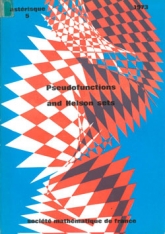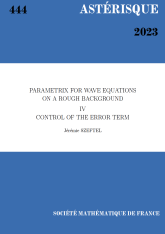
- Consulter un extrait
- Année : 1973
- Tome : 5
- Format : Électronique, Papier
- Langue de l'ouvrage :
Anglais - ISBN : ISBN-13 978-2-85629-436-9
This volume consists of three parts. The first and third are by Thomas Körner, the second by Robert Kaufman. A short histo-rical note would be useful to explain this order. At the beginning of 1972, Th. Körner solved a problem which had been open for fifteen years and which had originally moti-vated the interest in Helson sets. The Helson sets on the circle are those closed sets on which any continuous function can be represen-ted as an absolutely convergent Fourie series. Such sets (with an apparently more restrictive definition, in fact equivalent) have been considered since 1952 by L. Carleson. In 1954, H. Helson showed that they carried no non-zero measure whose Fourier coefficients vent to zero at infinity. In 1956, J.P. Kahane and R. Salem cons-tructed perfect sets without true pseudomeasures (WTP), that is not carrying any distribution with bounded Fourier coefficients that is not a measure. These WTP sets are Helson sets and sets of synthesis; conversely, any Helson set which is a set of synthesis is a WTP set. The question of the existence of Helson sets which carry " true " pseudomeasures therefore turns out to be related to the problem of spectral synthesis. Malliavin's discovery (1959) solved this latter problem in a completely different way. Th. Körner constructed a Helson set which carried a pseu-domeasure whose Fourier coefficients went to 0 at infinity. Thus Helson's theorem is not true if " measure " is replaced by " pseudo-measure ". The set constructed is not a set of synthesis. At the beginning of 1973, R. Kaufman found another cons-truction, probabilistic, very elegant, and giving a stronger result: any set of multiplicity contains a set à-la-Körner. Independently and almost at the same time, Th. Yitirner considerably simplified an important part of this construction.
These results of Th. Körner and R. Kaufman bring back to importance the old and deep results of Piatetskii-Shapiro (1952-54) and, at the same time, they make the main result then more precise : the existence of a set of multiplicity in the ordinary sense which is not of multiplicity " in the restricted sense " (that is, on res-tricting to Fourier-Stieltjes series).


